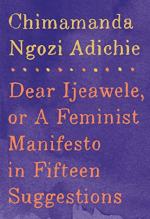
|
| Name: _________________________ | Period: ___________________ |
This test consists of 15 multiple choice questions and 5 short answer questions.
Multiple Choice Questions
1. What point does Adichie make about the inequality of marriage proposals against her opposing "less than" feminsits?
(a) A man can stay with a woman as long as he wants without caring.
(b) A woman has to be asked first; the woman do not have the power.
(c) A man feels obligated to ask a woman when he is ready; he does not care if the woman says yes.
(d) A woman feels obligated to say yes when asked; men have the control.
2. How does Adichie address homosexuality on Page 62?
(a) Some people are gay and that is fine.
(b) Some people are gay and some are not.
(c) Igbo tradition goes against homosexuality, but Chizalum can do what she prefers.
(d) Some people are gay, and they would be ostracized in Nigeria.
3. When does Adichie say Ijeawele should talk to Chizalum about sex?
(a) At an early age.
(b) Adult age.
(c) Never.
(d) Teenage years.
4. What was Adichie's Igbo nickname growing up?
(a) Ada Gladys Dike.
(b) Ada Obodo Dike.
(c) Adichie Dike Ada.
(d) Obodo Ada Adichie.
5. Adichie specifies that Ijeawele does not need to be what for Chizalum when talking about love?
(a) Mother.
(b) Confidant.
(c) Sister.
(d) Friend.
6. What is one argument that Adichie makes about the difficulty for women to have to change their names after marriage?
(a) Women have to change passports, birth certificates, business licenses, and checking accounts.
(b) Women have to change credit cards, mortgage documents, and children's last names.
(c) Women have to change their passports, signatures, social security numbers, and phone numbers.
(d) Women have to change passports, drivers' licenses, signatures, initials, and bank accounts.
7. When should Chizalum receive praise as textually stated in Suggestion 8?
(a) Chizalum needs praise when she speaks truthfully, argues against others, and is brave.
(b) Chizalum needs praise when she does well in school and is kind to others.
(c) Chizalum needs praise when she is open and honest.
(d) Chizalum needs praise when she speaks truthfully, takes a stand, and is kind to others.
8. Adichie says it is not enough to raise a daughter you can speak to about sex, but rather, Ijeawele needs to provide what other skill as well?
(a) Ijeawele needs to give Chizalum the freedom to also not speak with her.
(b) Ijeawele needs to give Chizalum the language to talk to her.
(c) Ijeawele needs to give Chizalum the opportunity to speak with her father as well.
(d) Ijeawele needs to give Chizalum the physical instructions on how to be safe about sex.
9. As mentioned in Suggestion 12, what happened at the seminar Adichie and Ijeawele went to?
(a) The seminar told the girls that men would come after them at earlier ages.
(b) The seminar threatened that girls should not ever speak with boys, because boys are bad news.
(c) The seminar suggested that girls wait until marriage to engage in relations with boys.
(d) The seminar threatened that talking to boys would end up with girls being pregnant or disgraced.
10. At the start of Suggestion 14, Adichie suggest that oppression be taught, but not to turn the oppressed into what?
(a) Martyrs.
(b) Saints.
(c) Servants.
(d) Homeless people.
11. What does Adichie believe is the most important thing in life, as stated in Suggestion 13?
(a) Dignity.
(b) Love.
(c) Independence.
(d) Feminism.
12. In Suggestion 12, what does Adichie feel is most important when teaching Chizalum language about private parts?
(a) Ijeawele can allow Chizalum to choose the language she wants.
(b) Ijeawele can choose the appropriate words, but Chizalum may rebel.
(c) Ijeawele can decide what names she wants, but they should not be shameful.
(d) Ijeawele can give Chizalum most positive language, and Chizalum needs to always use it.
13. When should Chizalum accept people walking different paths, as recommended by Suggestion 15?
(a) Chizalum should accept different paths if they encourage change.
(b) Chizalum should accept different paths if they do no harm to others.
(c) Chizalum should accept different paths if they are morally strong.
(d) Chizalum should accept different paths if they match her's.
14. Who are social norms created by?
(a) The government.
(b) Men.
(c) Society as a whole.
(d) Human beings.
15. Adichie recognizes in Suggestion 14 that female goodness is as normal as what?
(a) Female evil.
(b) Male goodness.
(c) Male oppression of women.
(d) Female wealth.
Short Answer Questions
1. Who else should Chizalum be surrounded by aside from a village of Aunties?
2. At the end of the text, what is Adichie's last wish for Chizalum?
3. What does Suggestion 7 state should never be considered an achievement?
4. How does Adichie describe female misogyny in Suggestion 14?
5. What is one benefit Adichie mentions of teaching Chizalum about difference?
|
This section contains 899 words (approx. 3 pages at 300 words per page) |

|




